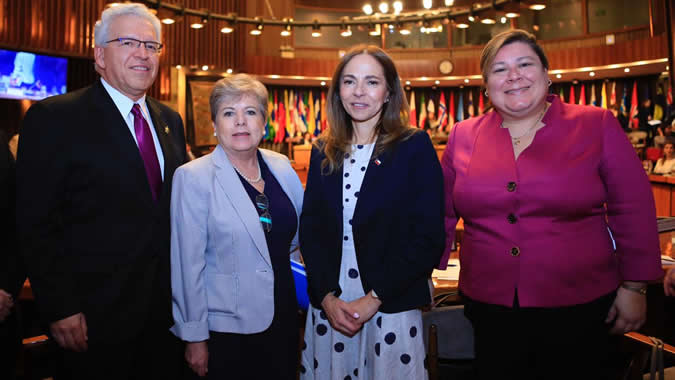Normative Frameworks are Necessary but Insufficient for Achieving Gender Equality in the Region, Specialists at ECLAC Agreed
Work area(s)
A seminar on women’s economic autonomy was inaugurated by Isabel Plá, the Minister of Women and Gender Equity of Chile; Alicia Bárcena, Executive Secretary of the Commission; and Boris E. Utria, representative of the World Bank Group.

Normative frameworks are necessary but they are not enough to achieve substantive equality between men and women, according to the specialists gathered at the inauguration of the seminar Normative Frameworks for Women’s Economic Autonomy and Gender Equality, held this Monday, November 12, in Santiago, Chile by the World Bank Group and the Economic Commission for Latin America and the Caribbean (ECLAC).
The opening remarks were made by Alicia Bárcena, ECLAC’s Executive Secretary; Sandie Okoro, Senior Vice President and General Counsel for the World Bank Group (via video); and Boris E. Utria, Operations Manager for Bolivia, Chile, Ecuador and Peru at the World Bank Group. Afterwards, the Minister of Women and Gender Equity of Chile, Isabel Plá, offered an inaugural address.
“The current economic situation and the prospects for 2019 are not favorable for citizens in general, and for women in particular, to achieve greater economic autonomy. That is why we are determined to break the statistical silence regarding women’s total work and inequality in income, wealth and full access to the labor world with all rights,” said Alicia Bárcena, who stressed that “the elusive economic autonomy of women will continue to be one of ECLAC’s priorities.”
“Gender inequality, in addition to being unfair, is profoundly inefficient. It is an obstacle that conspires against sustainable development. It is inefficient that in Latin America and the Caribbean women have higher education levels than men and face discrimination in labor markets,” Bárcena explained, adding that “this failure to take advantage of women’s capacities, and the glass ceiling that keeps them from accessing senior, decision-making posts, is a ceiling on our countries’ productivity.”
“Gender equality contributes to creating diverse work environments, driving innovation and narrowing structural gaps,” she emphasized.
Bárcena recalled that women’s labor participation rate remains stagnant at around 52% (that of men is 76.6%), and half of all employed women (51.4%) work in low productivity-sectors with precarious labor conditions. Eleven percent of women are employed for paid domestic work, a sector that has low wages, long workdays and greater levels of informality than other sectors of the economy. In addition, regardless of the efforts made, women still receive salaries that are 16.1% below those of men with the same profile.
In a video greeting, Sandie Okoro, Senior Vice President and General Counsel for the World Bank Group, indicated that “at the World Bank Group, we believe gender equality is a cross-cutting development solution for ending extreme poverty and promoting shared prosperity.” She added: “The report Women, Business and the Law highlights that when women are protected from domestic violence, their life expectancy is longer; where there are public child-care services, women are more likely to be employed; where there are strong property rights, more women hold leadership positions in business; and where the law prohibits gender discrimination in access to credit, more women have accounts in financial institutions.”
Meanwhile, Boris E. Utria, Operations Manager for Bolivia, Chile, Ecuador and Peru at the World Bank Group, called for complementing legislation that tends to advance gender equality with financing for a cultural change. “I don’t think that there is a more important or urgent issue in the world than that cultural change toward respect for women, and women’s economic, social, political and cultural inclusion,” he said.
Chile’s Minister of Women and Gender Equity, Isabel Plá – in addition to listing the initiatives that her country’s government is currently developing in areas such as the matrimonial regime, violence and sexual harassment on the street, among others – sustained that “the democracies of the world and of Latin America, Chile among them, have worked with great intensity for years on the issue of gender equality because we believe in justice. But we also do this because it is an inevitable vehicle for progress.” She stated as well that “gender inequities are inefficient, they are an obstacle for the will to progress that we must renew in our region.”
Currently, ECLAC is supporting countries in the execution of the Montevideo Strategy for Implementation of the Regional Gender Agenda within the Sustainable Development Framework by 2030, agreed upon by the governments of Latin America and the Caribbean in 2016. The first of the ten pillars for implementation is precisely the normative framework, which is followed by: institutional architecture; participation; capacity-building and -strengthening; financing; communication; technology; cooperation; information systems; and monitoring, evaluation and accountability.
Chile will host the fifty-eighth meeting of the Presiding Officers of the Regional Conference on Women in Latin America and the Caribbean in January 2019 and the XIV Regional Conference in November of the same year. The conference, Bárcena said, will be a space for governments, inter-governmental and United Nations system organizations as well as civil society to exchange viewpoints regarding “women’s autonomy in changing economic scenarios.”
Related content
Analizarán en la CEPAL marcos normativos para la autonomía económica de las mujeres y la igualdad de género
Encuentro organizado por el Grupo Banco Mundial y la Comisión se realizará el lunes 12 de noviembre en Santiago, con la participación de la Ministra de la Mujer y la Equidad de Género de Chile,…

Seminario Marcos Normativos para la Autonomía Económica de las Mujeres y la Igualdad de Género.
El encuentro está organizado conjuntamente por la Comisión Económica para América Latina y el Caribe (CEPAL) y el Banco Mundial, y se presentará el informe "Mujer, Empresa y el Derecho 2018",
Country(ies)
- Latin America and the Caribbean
Contact
Public Information Unit
- prensa@cepal.org
- (56 2) 2210 2040
